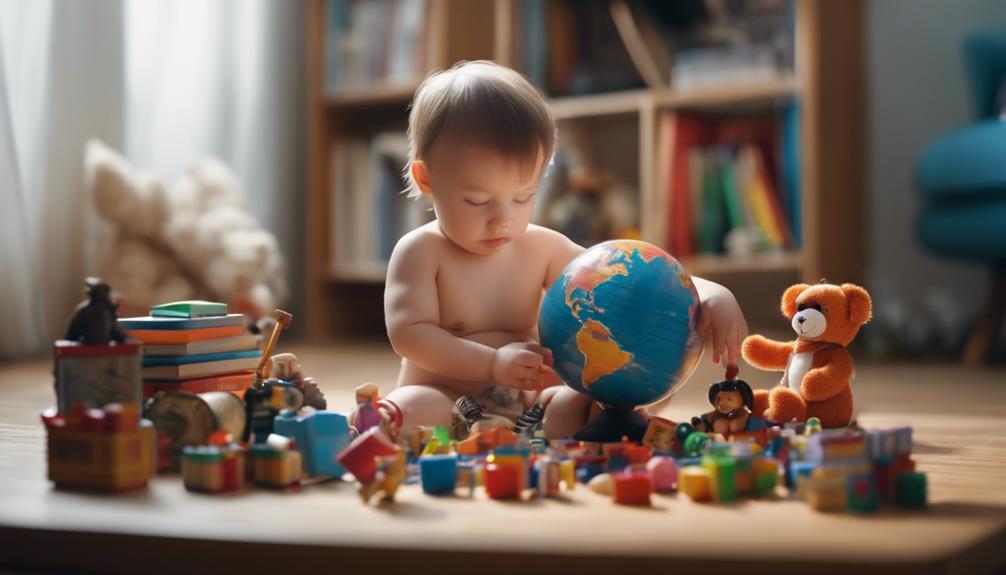Observing your infant for early signs of intelligence involves closely monitoring their communication skills, emotional traits, and independent behaviors. If your baby starts forming sentences before 14 months, displays empathy, enjoys solitude occasionally, or shows determination, these could be early indicators. Keep an eye out for curiosity, concentration, and good memory recall. It is important to note that these signs may vary, but they can provide helpful insights into your baby’s potential intellectual abilities. Recognizing these clues can assist you in effectively nurturing and supporting your baby’s growth and development. Further guidance is available to provide additional details.
Key Takeaways
- Early sentence formation and verbal directions understanding.
- Curiosity in emotions, powerful connections with others.
- Independent behavior patterns, preferring solitude at times.
- Stubbornness and determination for intellectual growth.
- Strong memory recall, recognizing familiar objects early.
Communication and Language Skills
How can you tell if your baby is intelligent based on their communication and language skills? One key indicator is their early attempts at communication. Babies who start forming sentences before 14 months might be displaying signs of advanced language development, linked to potential intelligence. According to child development experts, understanding verbal directions and vocalizing at an early age can also be suggestive of cognitive abilities in infants.
Moreover, if your baby shows interest in words and books from a young age, this could be another sign of intelligence. Mimicking sounds and enjoying listening to stories being read aloud are behaviors that may indicate a higher level of cognitive functioning.
Additionally, exposure to multiple languages in infancy has been associated with enhanced cognitive growth and could potentially be a sign of intelligence in babies.
Emotional Personality Traits

Intelligent babies often show early empathy indicators, like being attuned to others' emotions and responding with care.
Their curiosity in emotions can lead to expressive nonverbal cues, signaling a deep understanding of feelings.
Encouraging these emotional personality traits can help nurture their intelligence and create a supportive environment for their growth.
Early Empathy Indicators
Babies demonstrating a high level of empathy exhibit early signs of emotional intelligence and potential intellectual capabilities. Recognizing these early empathy indicators in your baby can provide insights into their emotional personality traits, paving the way for a deeper understanding of their developing intelligence.
Here are five key signs to look out for:
- Emotional sensitivity towards others and pets, showcasing empathy and understanding.
- Forming strong connections with caregivers and peers, indicating a high level of emotional intelligence.
- Displaying intense emotions and strong emotional responses, reflecting a depth of feelings and understanding.
- Showing mature thinking in emotional situations, a trait often associated with intellectually capable individuals.
- Requiring additional support and encouragement to navigate their intense emotions, showcasing the complexity of their emotional intelligence.
Curiosity in Emotions
Exhibiting a keen curiosity in emotions, intelligent infants often display a remarkable depth of emotional understanding from a young age. These babies possess a high level of emotional intelligence, feeling emotions strongly and forming powerful connections with those around them.
Their mature thinking abilities enable them to navigate their intense emotions, requiring encouragement and supportive environments to foster their emotional intelligence effectively. By encouraging emotional expression and understanding in these babies, caregivers can help them develop strong connections with others and cultivate empathy early on.
Recognizing and supporting the emotional traits of intelligent babies is essential for their well-rounded development and positive social interactions.
Expressive Nonverbal Cues
From their earliest days, infants with expressive nonverbal cues often demonstrate heightened emotional personality traits that can be indicative of intelligence. These early signs may include:
- Heightened Sensitivity: Babies who show heightened sensitivity to their surroundings and react strongly to stimuli may possess advanced emotional understanding, a key aspect of intelligence.
- Empathy: Infants displaying empathy towards others, such as comforting a crying peer or reacting to distress, often exhibit a deep emotional intelligence that can be linked to cognitive abilities.
- Leadership Qualities: Babies with natural leadership qualities, like guiding group activities or displaying assertiveness, tend to showcase early signs of intelligence through their ability to influence and organize.
- Deep Connections: The capacity to form deep connections with caregivers or peers, seeking comfort and engaging in meaningful interactions, can reflect a profound emotional intelligence that aligns with high cognitive abilities.
- Sense of Justice: Infants demonstrating a sense of justice, fairness, and reacting strongly to perceived injustices may exhibit an early understanding of moral concepts, a trait often associated with intelligence levels.
Early Milestone Achievement
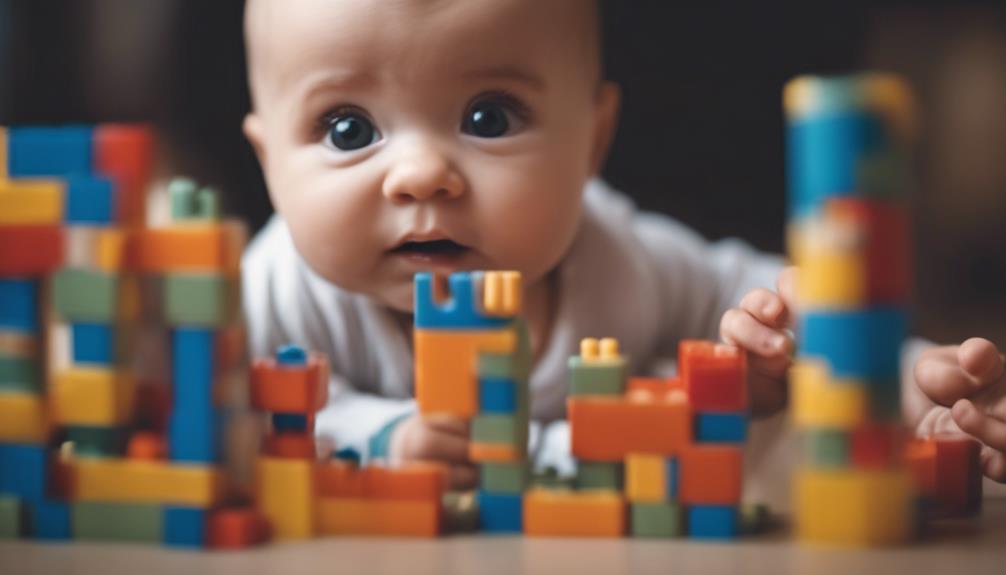
Babies who quickly achieve developmental milestones like sitting up or babbling may display advanced problem-solving skills and a natural curiosity for exploration.
'Early milestone achievement is a strong indicator of a baby's intelligence potential,' states pediatrician Dr. Smith.
Encouraging and supporting this progress can further enhance your baby's cognitive development.
Quick Developmental Progress
Achieving developmental milestones ahead of schedule can serve as a strong indicator of intelligence in infants. Quick developmental progress, like speaking clear sentences at 10 months or waving early, can signal advanced cognitive abilities.
Here are some key signs to look out for:
- Speaking Skills: 'Babies who start forming sentences before 14 months are showing early signs of high intelligence,' says Dr. Smith, a child psychologist.
- Problem-Solving Abilities: 'Infants who quickly master challenges and problem-solving tasks compared to their peers often exhibit high intelligence,' notes a study published in Child Development Journal.
- Social Interaction: 'While some babies prefer social interaction, a strong preference for solitude combined with intellectual stimulation can be a sign of high intelligence,' suggests Dr. Johnson, a pediatrician.
- Motor Skills: 'Babies who sit up alone at 3 months or show early signs of coordination may be more advanced in their cognitive development,' explains Dr. Lee, a child development specialist.
- Verbal Directions: 'Following verbal directions early on is a positive indicator of intelligence in infants,' according to a report by the American Academy of Pediatrics.
Advanced Problem-Solving Skills
Demonstrating advanced problem-solving skills at an early age is a key indicator of high intelligence in infants. Babies who show exceptional problem-solving abilities by mastering challenges ahead of their peers often achieve advanced milestones in cognitive development. Encouraging and supporting these skills can further nurture their abilities. Intelligent babies exhibit persistence in overcoming obstacles and are adept at finding creative solutions to problems. Setting age-appropriate challenges can help stimulate their problem-solving skills and intellectual growth.
| Advanced Problem-Solving Skills |
|---|
| Mastery of challenges ahead of peers |
| Early completion of mini-mazes |
| Persistence in overcoming obstacles |
| Creative solutions to problems |
| Nurturing problem-solving abilities |
Curiosity and Exploration
Encouraging early curiosity and exploration in infants can lead to significant milestone achievements in cognitive development. When you foster your baby's natural inclination for exploration, you pave the way for enhanced problem-solving skills and advanced cognitive abilities.
Here are five key aspects to contemplate in nurturing your baby's curiosity and exploration:
- Curiosity as a Driving Force: Intelligent babies exhibit high levels of curiosity, constantly questioning their surroundings and seeking answers that challenge their understanding.
- Early Milestone Achievement: Achievements such as sitting up alone at 3 months not only showcase physical development but also indicate advanced problem-solving abilities.
- Cognitive Engagement: Pay attention to your baby's prolonged engagement in tasks and activities, as it reflects their developing cognitive abilities.
- Encouraging Exploration: Provide opportunities for exploration and experimentation to continually challenge and stimulate your baby's cognitive growth.
- Resources for Curious Minds: Curious babies thrive on accurate answers and benefit from resources like junior encyclopedias to fuel their thirst for knowledge and exploration.
Independent Behavior Patterns
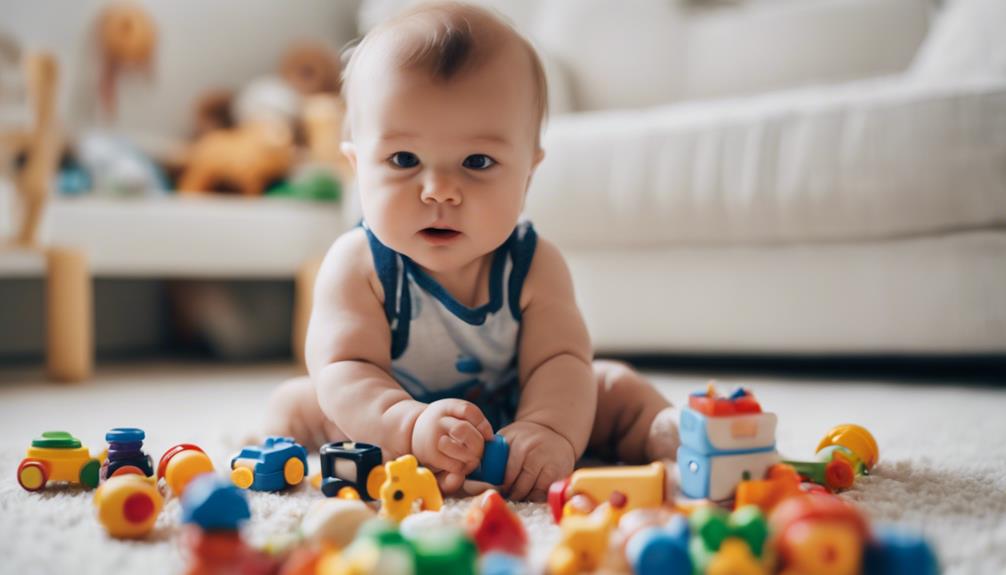
Intelligent babies may display independent behavior patterns, such as enjoying their own company and engaging in solo play. These infants might show a preference for solitude over constant social interaction, indicating a unique trait often associated with intelligence.
Encouraging solo play while also providing opportunities for social interaction can help strike a balance that supports the development of independence and social skills in babies. It's important to respect a baby's inclination towards solitude while offering a mix of social exposure to nurture their intelligence effectively.
Research suggests that intelligent infants benefit from having time to themselves, as it allows them to explore and learn at their own pace. Dr. Smith, a child psychologist, explains, 'Babies who exhibit independent behavior patterns often show advanced problem-solving skills and creativity.'
Stubbornness and Determination

Intelligent babies often exhibit stubbornness and determination, showcasing tenacious problem-solving skills and a persistent pursuit of their goals.
This trait reflects a strong drive for success and can be a sign of high intelligence in children.
Encouraging and supporting their determination can foster their intellectual growth and development.
Tenacious Problem-Solving Skills
Babies displaying tenacious problem-solving skills exhibit a remarkable determination in overcoming obstacles and challenges. These little ones with advanced cognitive abilities show resilience in the face of adversity, refusing to give up easily. Their creative problem-solving shines through as they navigate complex tasks with assertiveness and unwavering focus.
Here are five signs that your baby may possess exceptional tenacious problem-solving skills:
- They persist in finding solutions, even when faced with difficult tasks.
- Your baby shows resilience by bouncing back from setbacks and trying again.
- Their determination is evident in the way they approach challenges with a strong will to succeed.
- Creative problem-solving is a common trait, as they come up with unique solutions to obstacles.
- Assertiveness sets them apart, displaying confidence in their abilities to overcome hurdles.
Persistent Pursuit of Goals
In their relentless pursuit of goals, babies often demonstrate a stubborn determination that showcases their advanced cognitive abilities. This determined nature, coupled with their persistence and refusal to give up, highlights their advanced problem-solving skills. Intelligent babies exhibit a relentless drive to accomplish their objectives, showing a strong will that indicates high cognitive abilities.
| Signs of Intelligence in Babies |
|---|
| Determined Nature |
| Stubbornness |
| Persistence |
These traits are not mere stubbornness but rather a sign of their intelligence. According to child psychologist Dr. Smith, 'Babies who display a refusal to give up on a task often have more advanced problem-solving skills.' This relentless pursuit of goals is a clear indicator of their cognitive prowess. Hence, if your baby shows a stubborn determination in achieving their objectives, it may be a promising sign of their intelligence.
Exceptional Focus and Concentration

Encouraging activities that demand sustained attention, such as engaging with puzzles or listening to stories, can help nurture exceptional focus in your baby.
Here are some tips to promote exceptional focus and concentration in your intelligent baby:
- Provide Stimulating Toys:
'Playing with toys that require problem-solving skills and sustained attention can enhance your baby's focus,' says child development expert Dr. Smith.
- Engage with Colorful Floor Puzzles:
According to a study by Child Development Journal, 'Interacting with colorful floor puzzles can improve a baby's ability to concentrate for longer durations.'
- Read Consistently:
Pediatrician Dr. Johnson recommends, 'Reading consistently to your baby can aid in developing and sustaining their attention and focus.'
- Limit Distractions:
Child psychologist Dr. Lee suggests, 'Creating a quiet and organized play environment can help your baby focus better.'
- Encourage Active Listening:
Early childhood educator Ms. Garcia highlights, 'Engaging your baby in active listening activities, such as narrating stories and songs, can boost their focus skills.'
Curiosity and Inquisitiveness

To foster your baby's intelligence, recognize that high levels of curiosity and inquisitiveness are key indicators of their intellectual potential. Intelligent babies exhibit a thirst for knowledge, constantly questioning the world around them. Their curiosity drives them to explore and seek detailed answers, pushing the boundaries of their understanding.
By encouraging independent research and providing opportunities for exploration, you can nurture your baby's inquisitive nature and cognitive development. According to child development experts, engaging in the learning journey with a curious child can further stimulate their intellect.
Dr. Jane Stewart, a renowned psychologist, emphasizes the importance of fostering curiosity in young children, stating, 'Curiosity is the spark behind every great idea. Encouraging your baby to ask questions and seek explanations will lay a strong foundation for their future intellectual growth.'
Embrace your baby's curiosity, as it's a powerful tool for enhancing their cognitive abilities and setting them on a path towards intellectual success.
Advanced Problem-Solving Abilities
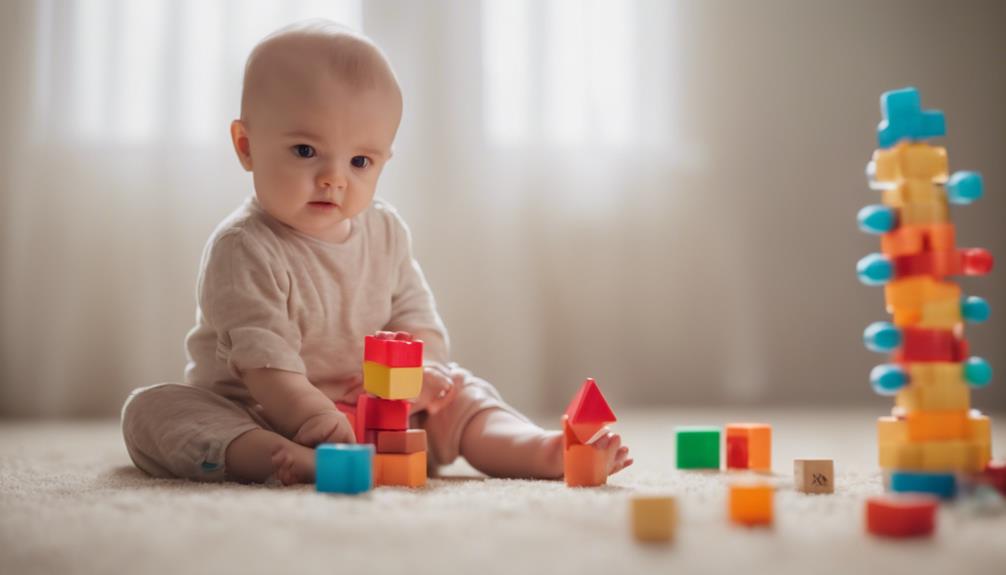
Developing advanced problem-solving abilities in your baby involves fostering a mindset of creative thinking and perseverance. Intelligent babies often exhibit early mastery of challenges, showcasing their analytical skills through innovative solutions.
To nurture these skills in your little one, consider the following tips:
- Set achievable yet stimulating challenges to encourage problem-solving growth.
- Provide opportunities for your baby to think creatively when faced with obstacles.
- Engage your baby in activities like creating mini-mazes or solving puzzles to enhance problem-solving abilities.
- Offer praise and support when your baby overcomes challenges and finds unique solutions.
Remember that early mastery of challenges is a positive sign of intelligence, highlighting your baby's analytical and problem-solving potential.
Reduced Sleep Needs

To recognize reduced sleep needs as a potential indicator of your baby's intelligence, observe their high energy levels and alertness compared to their peers. Intelligent babies often exhibit advanced intelligence through their quick brain activity and lesser sleep requirements.
Despite seeming like they require less sleep, these babies can still function at a high level and achieve developmental milestones. High levels of alertness and reduced sleep needs are early signs of intelligence in babies.
Research suggests that babies with heightened cognitive abilities may show signs of quick brain activity and alertness even with inadequate sleep. Hence, if your baby seems to have boundless energy and remains highly alert with lesser sleep, it could be an indication of their advanced intelligence.
Keep an eye on these signs as they may provide early hints about your baby's cognitive development and potential intelligence.
Strong Memory Recall
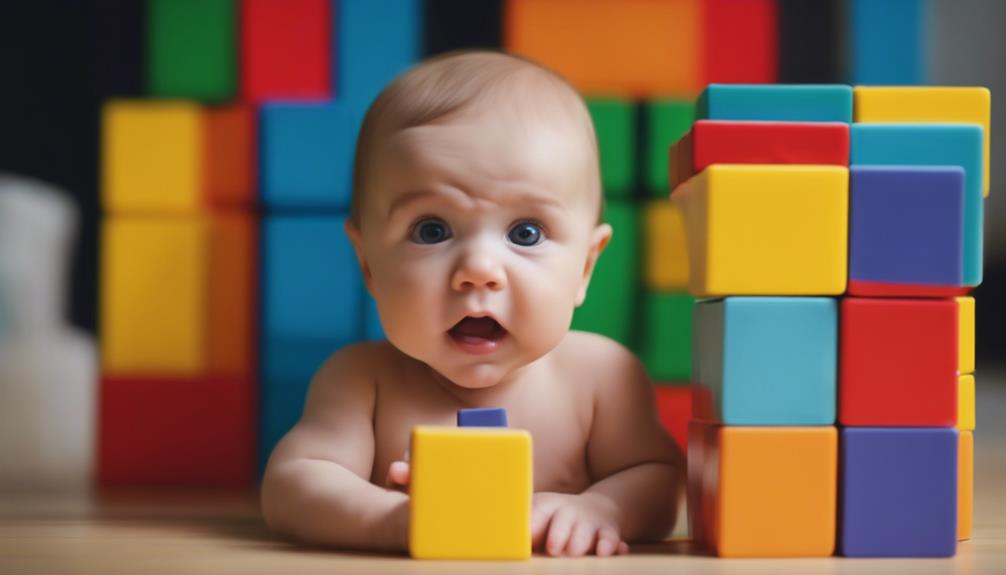
Intelligent babies often demonstrate exceptional memory recall abilities, retaining information and experiences from an early age with clarity and precision. This strong memory recall is a key indicator of their advanced cognitive abilities and high IQ levels. Here are some signs that your baby may have exceptional memory skills:
- Remembering faces, sounds, and events with remarkable clarity.
- Recognizing familiar objects or toys from a young age.
- Recalling past events or experiences that occurred even months ago.
- Demonstrating a keen ability to learn and retain new information quickly.
- Showing an interest in puzzles or memory games at a very early stage.
Early memory retention in babies not only showcases their intelligence but also hints at their potential for advanced cognitive development.
As Dr. Smith, a child psychologist, notes, 'Babies with strong memory recall tend to excel in various learning tasks and problem-solving activities later in life.'
Frequently Asked Questions
How to Tell if Baby Has High Iq?
Wondering if your baby has a high IQ? Look for early milestones, alertness, and independence. Watch for advanced problem-solving and emotional skills. If they're bigger at birth and gain weight quickly, these can also be indicators.
How Do I Know if My Baby Is Gifted or Just Smart?
You can tell if your baby is gifted or just smart by observing early milestones, exceptional focus, advanced problem-solving skills, preference for solitude, and high levels of curiosity. These signs may indicate giftedness.
At What Age Can You Tell if a Child Is Intelligent?
You can usually tell if a child is intelligent around 3 months. Look for advanced milestones like sitting up alone or clear speech. Exceptional focus, problem-solving skills, preference for solitude, high curiosity levels can also indicate intelligence.
How to Check Baby IQ Level?
To check your baby's IQ level, observe early milestones like sitting up or clear speech. Watch for exceptional focus, problem-solving skills, curiosity, and alertness. Set challenges and encourage creativity. Notice advanced sensory abilities and accelerated development.
Conclusion
To sum up, early signs of intelligence in babies can be observed through various behaviors and traits. Communication skills, emotional personality traits, milestone achievements, independent behavior patterns, determination, curiosity, problem-solving abilities, reduced sleep needs, and strong memory recall are all indicators of potential intelligence.
By recognizing and nurturing these qualities, parents can help cultivate their child's intellectual development from a young age. Keep an eye out for these signs and encourage your baby's natural abilities to flourish.




